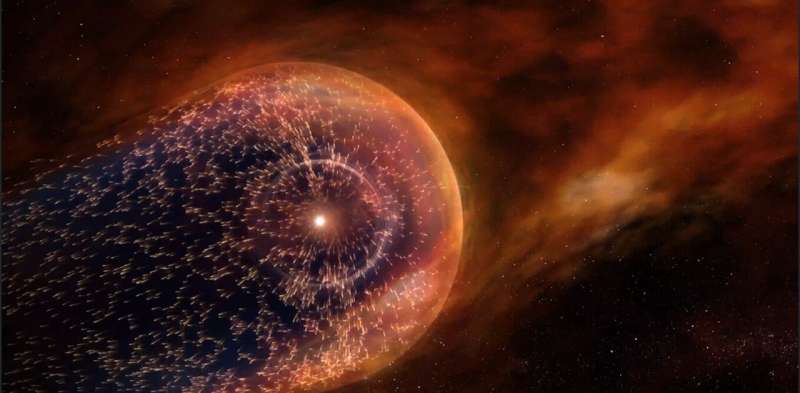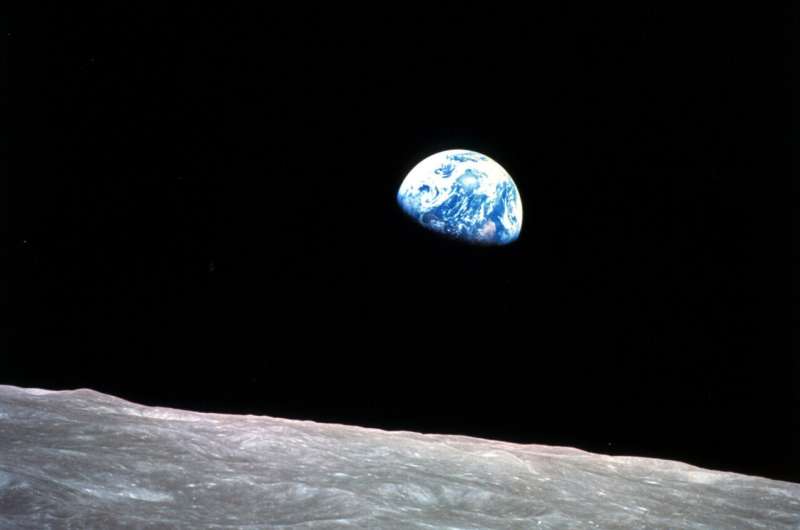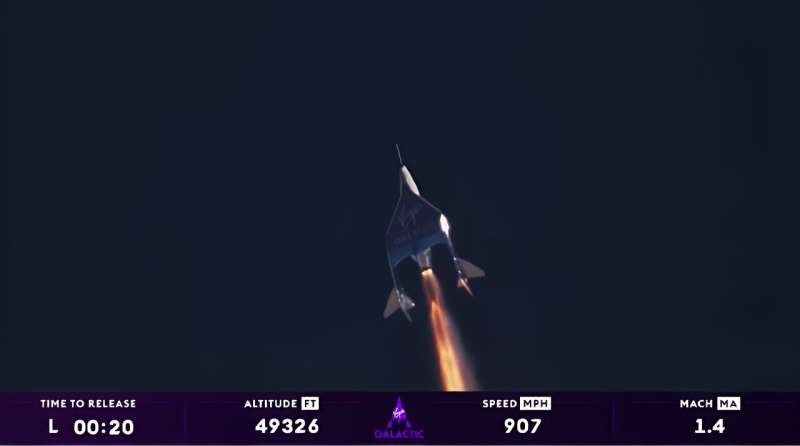Earliest detection of metals challenges understanding of first galaxies
Sunday, 09 June 2024 03:41 Astronomers have detected carbon in a galaxy just 350 million years after the Big Bang, marking the earliest detection of any element in the universe other than hydrogen.
Using the James Webb Space Telescope (JWST), an international team of astronomers led by the University of Cambridge observed a very young galaxy in the early universe and found that it contained surprising amounts of car
Astronomers have detected carbon in a galaxy just 350 million years after the Big Bang, marking the earliest detection of any element in the universe other than hydrogen.
Using the James Webb Space Telescope (JWST), an international team of astronomers led by the University of Cambridge observed a very young galaxy in the early universe and found that it contained surprising amounts of car New spectrograph to aid in search for extraterrestrial life
Sunday, 09 June 2024 03:41 ESO has signed an agreement with an international consortium of institutions for the design and construction of ANDES, the ArmazoNes high Dispersion Echelle Spectrograph. The ANDES instrument will be installed on ESO's Extremely Large Telescope (ELT). It will be used to search for signs of life in exoplanets and look for the very first stars, as well as to test variations of the fundamental cons
ESO has signed an agreement with an international consortium of institutions for the design and construction of ANDES, the ArmazoNes high Dispersion Echelle Spectrograph. The ANDES instrument will be installed on ESO's Extremely Large Telescope (ELT). It will be used to search for signs of life in exoplanets and look for the very first stars, as well as to test variations of the fundamental cons Rocket Lab plans 50th Electron mission to deploy five satellites for Kineis
Sunday, 09 June 2024 03:41 Rocket Lab USA, Inc. (Nasdaq: RKLB) ("Rocket Lab or "the Company) has announced the launch window for its 50th Electron mission, which will deploy five Internet-of-Things (IoT) satellites for French company Kineis.
The 'No Time Toulouse' mission is scheduled to launch from Rocket Lab Launch Complex 1 in Mahia, New Zealand during a 14-day launch window that opens on June 19th, 2024, NZST.
Rocket Lab USA, Inc. (Nasdaq: RKLB) ("Rocket Lab or "the Company) has announced the launch window for its 50th Electron mission, which will deploy five Internet-of-Things (IoT) satellites for French company Kineis.
The 'No Time Toulouse' mission is scheduled to launch from Rocket Lab Launch Complex 1 in Mahia, New Zealand during a 14-day launch window that opens on June 19th, 2024, NZST. Apollo 8 astronaut dies in small plane crash at age 90
Sunday, 09 June 2024 03:41 William Anders, the former US astronaut who took the historic "Earthrise" photo from space over 55 years ago, died in a plane crash on Friday at the age of 90, his family said.
Anders had been piloting a small plane which crashed off the coast of Washington state on Friday morning, his son told US media. Anders was alone in the plane.
His body was later recovered by a dive team, The Seat
William Anders, the former US astronaut who took the historic "Earthrise" photo from space over 55 years ago, died in a plane crash on Friday at the age of 90, his family said.
Anders had been piloting a small plane which crashed off the coast of Washington state on Friday morning, his son told US media. Anders was alone in the plane.
His body was later recovered by a dive team, The Seat Astronomers Await Visible Nova Event in Corona Borealis
Sunday, 09 June 2024 03:41 This summer, astronomers around the world, both professional and amateur, will focus on a small constellation in the night sky. The focus is on a dark spot in the Corona Borealis, where a bright nova event, visible to the naked eye, is expected.
"It"s a once-in-a-lifetime event that will create a lot of new astronomers out there, giving young people a cosmic event they can observe for them
This summer, astronomers around the world, both professional and amateur, will focus on a small constellation in the night sky. The focus is on a dark spot in the Corona Borealis, where a bright nova event, visible to the naked eye, is expected.
"It"s a once-in-a-lifetime event that will create a lot of new astronomers out there, giving young people a cosmic event they can observe for them Milky Way Collision Occurred Billions of Years Later Than Previously Thought
Sunday, 09 June 2024 03:41 Rensselaer Polytechnic Institute"s Heidi Jo Newberg, Ph.D., professor of astronomy; Tom Donlon, Ph.D., a visiting researcher at Rensselaer and a postdoctoral researcher at the University of Alabama; and their team have published research revealing that the Milky Way Galaxy"s last major collision occurred billions of years later than previously believed.
The discovery was made possible by t
Rensselaer Polytechnic Institute"s Heidi Jo Newberg, Ph.D., professor of astronomy; Tom Donlon, Ph.D., a visiting researcher at Rensselaer and a postdoctoral researcher at the University of Alabama; and their team have published research revealing that the Milky Way Galaxy"s last major collision occurred billions of years later than previously believed.
The discovery was made possible by t Artificial gravity space stations in development for Europe
Sunday, 09 June 2024 03:41 Many are familiar with movies like "2001: A Space Odyssey" and "Star Trek," where astronauts live and work on space stations with artificial gravity. This science fiction is becoming reality.
ESA Director General Josef Aschbacher and Vast CEO Max Haot signed a Memorandum of Understanding for future Vast space stations during Space Day at the Berlin International Airshow (ILA) on June 6, 20
Many are familiar with movies like "2001: A Space Odyssey" and "Star Trek," where astronauts live and work on space stations with artificial gravity. This science fiction is becoming reality.
ESA Director General Josef Aschbacher and Vast CEO Max Haot signed a Memorandum of Understanding for future Vast space stations during Space Day at the Berlin International Airshow (ILA) on June 6, 20 UAH Research Suggests Gravity Without Mass Could Eliminate Need for Dark Matter
Sunday, 09 June 2024 03:41 Dark matter, hypothesized to explain gravitational effects that general relativity cannot, remains enigmatic since its proposal in 1932 by Dutch astronomer Jan Oort. Dr. Richard Lieu from The University of Alabama in Huntsville (UAH) has published a paper in the Monthly Notices of the Royal Astronomical Society proposing an alternative theory. Lieu's work suggests gravity can exist without mass,
Dark matter, hypothesized to explain gravitational effects that general relativity cannot, remains enigmatic since its proposal in 1932 by Dutch astronomer Jan Oort. Dr. Richard Lieu from The University of Alabama in Huntsville (UAH) has published a paper in the Monthly Notices of the Royal Astronomical Society proposing an alternative theory. Lieu's work suggests gravity can exist without mass, Virgin Galactic conducts final VSS Unity commercial suborbital spaceflight
Saturday, 08 June 2024 16:01

NASA considering an interstellar probe to study the heliosphere, the region of space influenced by the sun
Saturday, 08 June 2024 09:50

The sun warms the Earth, making it habitable for people and animals. But that's not all it does, and it affects a much larger area of space. The heliosphere, the area of space influenced by the sun, is over a hundred times larger than the distance from the sun to the Earth.
The sun is a star that constantly emits a steady stream of plasma—highly energized ionized gas—called the solar wind. In addition to the constant solar wind, the sun also occasionally releases eruptions of plasma called coronal mass ejections, which can contribute to the aurora, and bursts of light and energy, called flares.
Former astronaut William Anders, who took iconic Earthrise photo, killed in Washington plane crash
Saturday, 08 June 2024 08:57

Virgin Galactic set for final spaceflight before two-year pause
Saturday, 08 June 2024 08:55
Virgin Galactic is poised on Saturday for its last spaceflight before heading into a two-year pause on commercial operations to upgrade its fleet, as the company seeks to finally turn a profit.
The "Galactic 07" mission is scheduled to begin at around 8:30 am Mountain Time (1430 GMT) from the company's base in Spaceport, New Mexico, a spokesman said.





